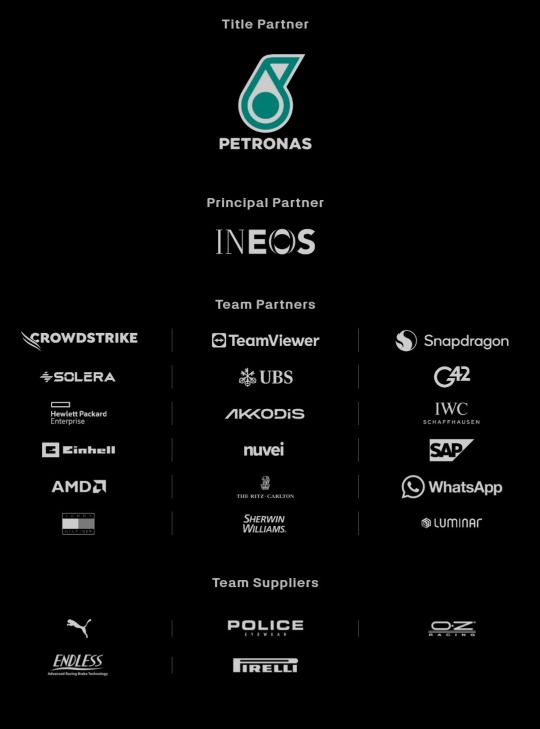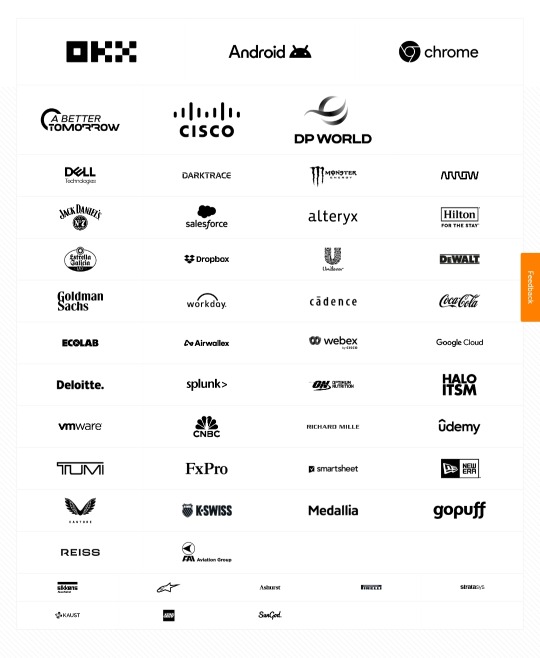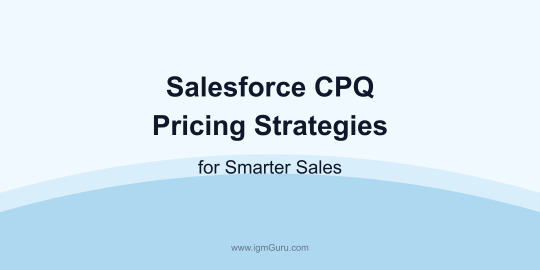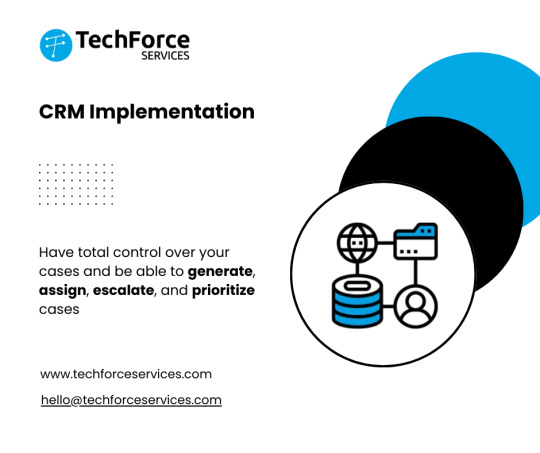#salesforce financial services cloud training
Explore tagged Tumblr posts
Text
2024 team sponsors recap!
this is completely irrelevant to F1 but i study and do these stuffs for a living sooo 😩😩 2023 sponsors are based on the sponsors that are there at the beginning of the season (new sponsors that join in the middle of the season will be classified as 2024's)
Mercedes AMG Petronas F1 Team:

New sponsors: Whatsapp, Luminar (American tech company), SAP (German software company), nuvei (Canadian credit card services), Sherwin Williams (American painting company) 2024 data last update: 2024/02/14
Old sponsors that left: Monster Energy, Pure Storage (American technology company), fastly (American cloud computing services), Axalta (American painting company), Eight sleep (American mattresses company) 2023 data last update: 2023/01/07
Oracle Red Bull Racing F1 Team:

New sponsors: Yeti (American cooler manufacturer, joined later in 2023), APL (American footwear/athletic apparel manufacturer, joined later in 2023), CDW (American IT company, joined later in 2023), Sui (American tech app by Mysten Labs, joined later in 2023), Patron Tequila (Mexican alcoholic beverages company, joined later in 2023) 2024 data last update: 2024/02/15
Old sponsors that left: CashApp, Walmart, Therabody (American wellness technology company), Ocean Bottle (Norwegian reusable bottle manufacturer), PokerStars (Costa Rican gambling site), Alpha Tauri (? no info if they're official partners or not but Austrian clothing company made by Red Bull), BMC (Switzerland bicycle/cycling manufacturer), Esso (American fuel company, subsidiary of ExxonMobil), Hewlett Packard Enterprise (American technology company) 2023 data last update: 2023/03/07
More: Esso is a subsidiary of Mobil so there's possibility they merged or something
Scuderia Ferrari:

New sponsors: VGW Play (Australian tech game company, joined later in 2023), DXC Technology (American IT company, joined later in 2023), Peroni (Italian brewing company), Z Capital Group/ZCG (American private asset management/merchant bank company), Celsius (Swedish energy drink manufacturer) 2024 data last update: 2024/02/15
Old sponsors that left: Mission Winnow (American content lab by Phillip Morris International aka Marlboro), Estrella Garcia (Spanish alcoholic beverages manufacturer), Frecciarossa (Italian high speed train company) 2023 data last update: 2023/02/16
More: Mission Winnow is a part of Phillip Morris International. They are no longer listed as team sponsor but PMI is listed instead.
(starting here, 2023 data last update is 2023/02/23 and 2024 data last update is 2024/02/15)
McLaren F1 Team: (Only McLaren RACING's data is available idk if some of these are XE/FE team partners but anw..)

New sponsors: Monster Energy, Salesforce (American cloud based software company, joined later in 2023), Estrella Garcia (Spanish alcoholic beverages manufacturer), Dropbox (American file hosting company), Workday (American system software company, joined later in 2023), Ecolab (American water purification/hygiene company), Airwallex (Australian financial tech company), Optimum Nutrition (American nutritional supplement manufacturer), Halo ITSM (American software company, joined later in 2023), Udemy (American educational tech company, joined later in 2023), New Era (American cap manufacturer, joined in 2023), K-Swiss (American shoes manufacturer, joined later in 2023), Alpinestars (Italian motorsports safety equipment manufacturer)
Old sponsors that left: DP World (Emirati logistics company), EasyPost (American shipping API company), Immersive Labs (UK cybersecurity training company?), Logitech, Mind (UK mental health charity), PartyCasino (UK? online casino site), PartyPoker (American? gambling site), Sparco (Italian auto part & accessory manufacturer), Tezos (Switzerland crypto company)
Aston Martin Aramco F1 Team:

New sponsors: Valvoline (American retail automotives service company, joined later in 2023), NexGen (Canadian sustainable? fuel company), Banco Master (Brazilian digital banking platform, joined later in 2023), ServiceNow (American software company, joined later in 2023), Regent Seven Seas Cruise, Wolfgang Puck (Austrian-American chef and restaurant owner, joined later in 2023), Financial Times (British business newspaper), OMP (Italian racing safety equipment manufacturer), stichd (Netherlands fashion & apparel manufacturer)
Old sponsors that left: Alpinestars (Italian motorsports safety equipment manufacturer), crypto.com (Singaporean cryptocurrency company), ebb3 (UK? software company), Pelmark (UK fashion and apparel manufacturer), Peroni (Italian brewing company), Porto Seguro (Brazilian insurance company), Socios (Malta's blockchain-based platform), XP (Brazilian investment company)
Stake F1 Team (prev. Alfa Romeo):
???? Can't found their website (might be geoblocked in my country???)
BWT Alpine F1 Team:

New sponsors: MNTN (American software company), H. Moser & Cie (Switzerland watch manufacturer), Amazon Music
Old sponsors that left: Bell & Ross (French watch company), Ecowatt (??? afaik French less-energy smthn smthn company), Elysium (French? American? Software company), KX (UK software company), Plug (American electrical equipment manufacturing company)
Visa CashApp RB F1 Team (prev. Scuderia Alpha Tauri):

New Sponsors: Visa, CashApp, Hugo Boss, Tudor, Neft Vodka (Austrian alcoholic beverages company), Piquadro (Italian luxury bag manufacturer)
Old sponsors that left: Buzz (?), Carl Friedrik (UK travel goods manufacturer), Flex Box (Hongkong? shipping containers manufacturer), GMG (Emirati global wellbeing company), RapidAPI (American API company)
Haas F1 Team:

New sponsors: New Era (American cap manufacturer, joined later in 2023)
Old sponsors that left: Hantec Markets (Hongkong capital markets company), OpenSea (American NFT/Crypto company)
Williams Racing:


New sponsors: Komatsu, MyProtein (British bodybuilding supplement), Kraken (American crypto company, joined later in 2023), VAST Data (American tech company), Ingenuity Commerce (UK e-commerce platform), Puma (joined later in 2023)
Old sponsors that left: Acronis (Swiss software company), Bremont (British watch manufacturer), Dtex Systems (American? cybersecurity company), Financial Times (British business newspaper), Jumeirah Hotels & Resorts, KX (UK software company), OMP (Italian racing safety equipment manufacturer), PPG (American painting manufacturer), Umbro (English sports equipment manufacturer), Zeiss (German opticals/optometrics manufacturing company)
#mercedes amg petronas#red bull racing#scuderia ferrari#visa cash app rb#haas f1 team#mclaren f1#aston martin#alpine f1#williams racing#stake f1 team#f1#ari's rant#sponsor talks
42 notes
·
View notes
Text
How Cloud Computing Enables Remote Work and Productivity
The workplace has drastically changed recently, with remote work becoming the norm across various sectors. This shift in work is thanks to the advances of cloud computing. By allowing enterprises to access on-demand databases, applications, and collaboration tools, cloud computing will enable enterprises to work seamlessly regardless of their employees' locations.
If you're looking to establish a career in the ever-expanding field of cloud computing, registering for a course in Bangalore could empower you with the knowledge and skills needed. Learn how cloud computing plays an essential part in remote working and increases efficiency, and feel confident in your ability to navigate this dynamic field.
The Role of Cloud Computing in Remote Work
1. Anywhere, Anytime Access to Data
One significant issue remote workers face is accessing essential documents and apps from various locations. Cloud computing solves this problem by allowing central storage via platforms such as Google Drive, Dropbox, and Microsoft OneDrive. Workers can log in at any time, on any device, and access all the information they require for their work.
A marketing company with staff members scattered across several cities may collaborate on a single campaign at any time by using cloud-based tools such as Trello and Asana to manage projects. This eliminates the stress of sending files in and out, which can lead to delays and misunderstandings.
2. Seamless Collaboration and Communication
A productive collaboration system is vital for remote teams. Cloud-based applications help facilitate collaboration more than ever. Platforms such as Slack, Zoom, and Microsoft Teams allow employees to communicate instantly, conduct virtual meetings, and share documents easily.
Software developers use GitHub, a cloud-based service, to create, review, edit, and combine modifications to code. It allows developers to collaborate on the same task at the same time, regardless of whether they're in different time zones.
3. Enhanced Security and Data Protection
Many companies hesitate to use remote working because of security fears. Cloud computing services, however, provide robust security options, such as data encryption, authentication with multiple factors, and automatic backups. These options protect business-sensitive information from hackers, giving you a sense of reassurance and peace of mind.
Financial institutions, for instance, use cloud-based security measures to safeguard customers' banking data. A cloud computing certificate at Bangalore will help IT experts understand how to apply these security measures efficiently within their organization.
4. Scalability and Cost-Effectiveness
Cloud computing lets companies expand their resources or scale them down according to need. Instead of investing a large amount in IT infrastructure, companies can sign up for cloud services and pay for only the amount they use. This is especially beneficial to entrepreneurs and businesses with tight budgets.
For instance, a growing e-commerce business could use cloud services such as AWS or Azure to cope with seasonal surges of traffic and ensure that its site is always responsive, even during high-sales times. Cloud computing is flexible, making it an essential tool for businesses of any size. It can help you adapt to the ever-changing demands of the digital market.
How Cloud Computing Enhances Productivity
5. Automation and Workflow Optimization
Cloud-based apps automate routine jobs, freeing workers from time-consuming tasks. CRM software, such as Salesforce, streamlines customer interaction, and HR software, such as Workday, helps streamline employee pay and management.
An HR department working remotely could use cloud-based recruiting platforms to track applications, schedule interviews, and onboard new employees without delay. Professionals who attend an online cloud computing training course in Bangalore usually gain knowledge of these automation tools, which are, therefore, valuable for any company.
6. Business Continuity and Disaster Recovery
Unexpected incidents, such as power interruptions, cyber-attacks, or hardware problems, can disrupt processes. Cloud computing provides business continuity by storing important data across multiple secure sites. In the event of a server failure, another one takes over to prevent data loss.
For example, during the COVID-19 outbreak, several companies that had already adopted cloud computing could easily transition to remote working. Cloud backups and remote access features ensured that employees worked without interruptions.
7. Rapider decision-making using real-time insights
Cloud computing enables real-time data analysis, helping businesses make informed decisions quickly. Tools such as Google Analytics and Microsoft Power BI give insight into customer behaviors, sales trends, and operational efficiency.
A website retailer can track consumer preferences in real time and adjust its marketing strategies accordingly. The best professionals trained by the top cloud computing center in Bangalore are taught how to utilize cloud-based tools for data analytics to boost business growth.
Future of Remote Work: Cloud Computing Future of Remote Work with Cloud Computing
While businesses continue to adopt hybrid and remote work models, the need for cloud-based professionals is increasing. Employers require highly skilled people capable of managing cloud infrastructures, increasing security, and improving cloud-based services.
The cloud computing course in Bangalore is an excellent method for gaining experience in the field. If you're an IT professional or someone who is looking to change careers and become a cloud computing expert, getting a certification in Bangalore gives you the advantage in the market to succeed in the digital age.
Final Thoughts
Cloud computing has transformed remote work by making it easier, more efficient, and safer. From seamless collaboration to improved productivity, the advantages are undisputed. When companies continue investing in cloud technology, experts skilled in cloud technology are in great demand.
Suppose you're thinking about the possibility of a career in this area. In that case, choosing the top cloud computing institution located in Bangalore can help you gain real-world experience and industry-recognized accreditations. Future work opportunities are cloud-driven. Are you willing to take part in it?
0 notes
Text
The Power of Power BI: Transforming Data into Action
In today’s digital age, data is one of the most valuable assets for businesses. However, having data alone is not enough—it needs to be transformed into meaningful insights that drive decision-making. This is where Power BI, Microsoft’s business intelligence tool, comes into play. For those looking to enhance their skills, Power BI Online Training & Placement programs offer comprehensive education and job placement assistance, making it easier to master this tool and advance your career.

Power BI enables organizations to visualize data, analyze trends, and make data-driven decisions that lead to business growth. Let’s explore how Power BI can revolutionize the way businesses use data.
1. What is Power BI?
Power BI is a powerful business analytics tool that allows businesses to connect, visualize, and analyze their data from multiple sources. It enables users to create interactive dashboards, reports, and real-time analytics to make informed decisions.
2. Key Features That Make Power BI a Game-Changer
a) Interactive Dashboards and Data Visualization
Power BI turns raw data into stunning, easy-to-understand charts, graphs, and reports. These visuals help businesses quickly identify patterns and make better decisions.
b) Real-Time Data Insights
With Power BI’s real-time analytics, businesses can track sales, customer interactions, and operational metrics as they happen. This allows organizations to react quickly to market changes and optimize strategies instantly.
c) AI-Powered Analytics
Power BI uses artificial intelligence and machine learning to analyze complex data sets and uncover hidden patterns. Features like Power BI Q&A allow users to ask questions in plain language and receive instant, data-driven answers.
d) Seamless Data Integration
Power BI connects with over 100+ data sources, including:
Microsoft Excel, SQL Server, and Azure
Google Analytics, Salesforce, and SAP
Cloud services like AWS and Google Cloud This makes it easy for businesses to combine data from different platforms for a holistic view of their operations.
e) Enhanced Security and Compliance
Power BI ensures that sensitive business data remains secure and compliant with industry regulations like GDPR, ISO, and HIPAA. Role-based access controls and data encryption add an extra layer of protection. It’s simpler to master this tool and progress your profession with the help of Best Online Training & Placement programs, which provide thorough instruction and job placement support to anyone seeking to improve their talents.

3. How Power BI Helps Businesses Make Smarter Decisions
a) Data-Driven Strategy Development
With Power BI, businesses can analyze past performance and forecast future trends, helping leaders make strategic, data-backed decisions.
b) Optimizing Operational Efficiency
Companies can monitor supply chains, employee productivity, and business processes in real time, allowing them to identify inefficiencies and improve operations.
c) Improving Customer Insights
By analyzing customer behavior and purchasing patterns, businesses can create personalized marketing strategies, boost customer engagement, and increase sales.
d) Financial Performance and Budgeting
Power BI allows finance teams to track revenues, expenses, and profitability with automated reports, making budget planning and financial forecasting easier.
4. Why Businesses Should Invest in Power BI
Cost-effective – Power BI offers affordable solutions for businesses of all sizes.
User-friendly – No extensive coding knowledge is required to create dashboards and reports.
Scalable – Whether you’re a startup or a large enterprise, Power BI grows with your business needs.
Cloud and on-premise options – Businesses can choose between cloud-based or on-premise deployment for flexibility.
5. Industries Benefiting from Power BI
Retail and e-commerce – Track sales, customer behavior, and product performance.
Healthcare – Monitor patient data, optimize resource allocation, and improve efficiency.
Finance and banking – Analyze financial performance, detect fraud, and manage risk.
Manufacturing – Optimize supply chain operations, reduce costs, and improve productivity.
Education – Track student performance, manage resources, and enhance learning experiences.
Conclusion
Power BI is revolutionizing the way businesses harness the power of data. By turning complex data into actionable insights, businesses can optimize operations, improve customer engagement, and drive revenue growth. Whether you are a small business, enterprise, or entrepreneur, Power BI provides the tools you need to make smarter, data-driven decisions.
0 notes
Text
OpenAI targets business sector with advanced AI tools
New Post has been published on https://thedigitalinsider.com/openai-targets-business-sector-with-advanced-ai-tools/
OpenAI targets business sector with advanced AI tools
.pp-multiple-authors-boxes-wrapper display:none; img width:100%;
OpenAI, the powerhouse behind ChatGPT, is ramping up efforts to dominate the enterprise market with a suite of AI tools tailored for business users.
The company recently revealed its plans to introduce a series of enhancements designed to make AI integration seamless for companies of all sizes. This includes updates to its flagship AI agent technology, expected to transform workplace productivity by automating complex workflows, from financial analysis to customer service.
“Businesses are looking for solutions that go beyond surface-level assistance. Our agents are designed to provide in-depth, actionable insights,” said Sarah Friar, CFO of OpenAI. “This is particularly relevant as enterprises seek to streamline operations in today’s competitive landscape.”
OpenAI’s corporate strategy builds on its ongoing collaborations with tech leaders such as Microsoft, which has already integrated OpenAI’s technology into its Azure cloud platform. Analysts say these partnerships position OpenAI to rival established enterprise solutions providers like Salesforce and Oracle.
AI research assistant tools
As part of its enterprise-focused initiatives, OpenAI is emphasising the development of AI research tools that cater to specific industries.
For instance, its AI models are being trained on legal and medical data to create highly specialised assistants that could redefine research-intensive sectors. This focus aligns with the broader market demand for AI-driven solutions that enhance decision-making and efficiency.
Infrastructure for expansion
OpenAI’s rapid growth strategy is supported by a robust infrastructure push. The company has committed to building state-of-the-art data centers in Europe and Asia, aiming to lower latency and improve service reliability for global users. These investments reflect OpenAI’s long-term vision of becoming a critical enabler in the AI-driven global economy.
Challenges and issues
However, challenges persist. The company faces mounting pressure from regulators concerned about data privacy and the ethical implications of deploying powerful AI tools. Critics also question the sustainability of OpenAI’s ambitious growth targets, given its significant operational costs and strong competition from other tech giants.
Despite these hurdles, OpenAI remains optimistic about its trajectory. With plans to unveil its expanded portfolio at the upcoming Global AI Summit, the company is well-positioned to strengthen its foothold in the burgeoning AI enterprise market.
(Editor’s note: This article is sponsored by AI Tools Network)
See also: OpenAI argues against ChatGPT data deletion in Indian court
Want to learn more about AI and big data from industry leaders? Check out AI & Big Data Expo taking place in Amsterdam, California, and London. The comprehensive event is co-located with other leading events including Intelligent Automation Conference, BlockX, Digital Transformation Week, and Cyber Security & Cloud Expo.
Explore other upcoming enterprise technology events and webinars powered by TechForge here.
Tags: ai, artificial intelligence, openai, tools
#2025#agent#agents#ai#ai & big data expo#ai agent#AI integration#AI models#ai news#AI research#ai summit#ai tools#amp#Analysis#Art#Article#artificial#Artificial Intelligence#Asia#author#automation#azure#azure cloud#Big Data#Building#Business#california#CFO#chatGPT#Cloud
0 notes
Text

Salesforce CPQ Pricing Strategies for Smarter Sales
As organizations across industries seek tools that allow them to extract meaningful insights from vast amounts of information, Salesforce CPQ (Configure, Price, Quote) has emerged as one of the go-to tools. Offering powerful analytics and reporting features that empower businesses with data-driven decisions making capabilities, Salesforce CPQ will soon become an essential skill set in order to remain competitive and relevant within their fields in 2025.
Let's investigate why Salesforce CPQ will remain an indispensable asset in 2025, its distinction from traditional business intelligence tools, and why its significance extends across professionals, students, and decision-makers alike.
The Complexity of Pricing in Today’s Sales Environment
Imagine trying to navigate an uncharted sea without any means of navigation; data in today's modern world is like that: unstructured and overwhelming. By 2025, organizations are expected to produce more data than ever before--IDC estimates global data creation will reach 163 Zettabytes by that year alone! Extracting meaningful insights from such vast amounts of information is no longer a luxury; rather it has become essential.
Salesforce CPQ is designed to offer businesses a structured solution for navigating this sea of data. By acting as a guide through the maze of data complexity and turning raw numbers into actionable insights, businesses can track key performance indicators, identify hidden trends, and make informed decisions that contribute to growth.
Empowering Decision-Makers
Decision makers in any organization face the challenging task of navigating through complex challenges and seizing opportunities, yet without access to relevant tools they may find their best decisions clouded by incomplete or inaccessible data - which is where Salesforce CPQ comes into its own.
Salesforce CPQ empowers decision-makers with intuitive dashboards and reports for data visualization. It transforms raw information into understandable insights that provide a clear view of business performance, from customer trends identification, sales performance analysis and forecasting future growth forecasting - giving decision-makers all of the tools needed for effective leadership.
Consider Salesforce CPQ the control tower of an organization, providing leaders with real-time access to critical data just like airline pilots use a control tower for safe flight navigation. In 2025's increasingly competitive and rapidly shifting business landscape, leaders will require fast and accurate interpretation of data in order to be competitive and stay relevant.
Bridge the Gap between Data and Action
Professionals often face difficulty translating data into actionable insights. Salesforce CPQ addresses this challenge by breaking complex information down into digestible chunks for ease of use - even those without technical backgrounds can utilize data effectively with this solution.
Salesforce CPQ's intuitive user-interface ensures seamless data interaction. Professionals can effortlessly build interactive reports, create custom dashboards, and perform advanced analytics - without needing extensive coding skills - making Salesforce CPQ an indispensable tool for marketing analysts, financial planners, operations managers, and those seeking online training with Salesforce CPQ. CPQ Training Online makes its accessibility a key advantage; users can learn and implement its capabilities easily to enhance decision making processes.
Imagine trying to bake a cake without instructions! Salesforce CPQ serves as the recipe book of data analysis--providing step-by-step guidance so users can generate accurate yet actionable insights. By 2025, businesses that aim to remain competitive must be able to turn data into clear strategies in order to stay ahead.
The Rise of Self-Service Analytics
Salesforce CPQ's signature feature is its emphasis on self-service analytics. In 2025, data democratization will continue its upward trajectory as more professionals, regardless of technical knowledge, seek ways to access, analyze and visualize data.
Salesforce CPQ empowers users to explore data independently, cultivating a culture of data-driven decision making. Its intuitive drag-and-drop interface, integration with other Salesforce tools like CRM and Analytics Cloud, as well as its extensive library of pre-built connectors makes this tool accessible for users of all skill levels.
Consider Salesforce CPQ like a self-service gas station: users don't require specialists or external resources to fuel up their vehicles. In 2025, professionals won't need IT teams to access and analyze data - instead they will have the tools at their fingertips that enable them to explore insights on their own.
Salesforce CPQ for Professionals and Students
Acquiring Salesforce CPQ skills can open up new career prospects for professionals already employed, especially as demand for data analysts, business intelligence specialists, and data-driven decision makers continues to rise. According to LinkedIn's list of sought-after skills by employers for roles requiring data analysis or business intelligence - Salesforce CPQ being one of them!
Students entering the workforce in 2025 will find Salesforce CPQ an indispensable skill, especially given today's data-driven world. Learning to interpret and visualize information is not simply advantageous but essential; therefore Salesforce CPQ gives students an edge that makes them highly marketable across fields such as finance, marketing, healthcare and technology.
Conclusion
Looking ahead to 2025, Salesforce CPQ promises to remain not just an invaluable tool but an indispensable skill set for professionals across industries. With data growing exponentially and demand increasing for actionable insights and self-service analytics gaining ground as work changes over time, Salesforce CPQ will play a central role in shaping the future of work.
0 notes
Text
Choosing the Right Salesforce Cloud for Your Business

In the digital age, selecting the right tools for your business can make or break your success. Salesforce, a leading customer relationship management (CRM) platform, offers a range of clouds tailored to various business needs. But with so many options, how do you choose the right one? This guide will help you navigate the world of Salesforce clouds to find the perfect fit for your business.
Understanding Salesforce Clouds
Salesforce provides a variety of clouds, each designed to cater to specific functions and industries. Here’s a quick overview:
Sales Cloud: Focused on sales automation, lead management, and performance tracking.
Service Cloud: Geared towards customer service, offering tools for case management, customer support, and service analytics.
Marketing Cloud: Designed for marketing automation, customer journeys, and campaign management.
Commerce Cloud: Built for e-commerce businesses, enabling personalized shopping experiences and seamless transactions.
Financial Services Cloud: Tailored for financial institutions, providing tools for client management, compliance, and advisor productivity.
Health Cloud: Focused on the healthcare sector, offering patient management, care coordination, and health analytics.
Community Cloud: Facilitates collaboration and communication through branded communities and portals.
Analytics Cloud: Offers powerful data analytics and business intelligence tools.
IoT Cloud: Integrates Internet of Things (IoT) data into business processes for real-time insights.
Steps to Choose the Right Salesforce Cloud
Assess Your Business Needs: Begin by identifying the specific needs of your business. Are you looking to streamline your sales processes, enhance customer service, or improve marketing campaigns? Understanding your primary objectives will help narrow down the options.
Consider Your Industry: Certain Salesforce clouds are designed for specific industries. For example, if you’re in healthcare, the Health Cloud might be the best choice, while financial institutions might benefit more from the Financial Services Cloud.
Evaluate Scalability: As your business grows, so will your needs. Ensure the cloud you choose can scale with your business. Salesforce offers scalable solutions, but it’s important to select one that aligns with your long-term goals.
Budget and ROI: Budget constraints are a reality for many businesses. Consider the costs associated with each cloud and evaluate the potential return on investment (ROI). While some clouds might have higher upfront costs, the long-term benefits could outweigh these initial expenses.
Integration Capabilities: Your CRM system needs to integrate seamlessly with other tools and platforms your business uses. Check the integration capabilities of each Salesforce cloud to ensure they can work harmoniously with your existing infrastructure.
User Experience and Training: The success of any new tool depends on how well your team can use it. Choose a Salesforce cloud that offers an intuitive user experience and provides ample training resources. This will ensure a smooth transition and higher adoption rates.
Support and Resources: Look into the support and resources available for each cloud. Salesforce offers extensive documentation, community forums, and customer support, but some clouds might have more specialized resources that can be beneficial for your specific needs.
Conclusion
Choosing the right Salesforce cloud for your business is a crucial decision that requires careful consideration. By assessing your business needs, considering your industry, evaluating scalability, budgeting, checking integration capabilities, prioritizing user experience, and leveraging support resources, you can find the perfect Salesforce cloud to drive your business forward.
Remember, the right Salesforce cloud can transform your operations, enhance customer satisfaction, and propel your business to new heights. Take the time to make an informed decision, and you’ll reap the benefits of a tailored CRM solution that aligns with your unique needs.
#salesforce#salesforce cloud#salesforce service cloud#salesforce marketing cloud#salesforce sales cloud#AI
0 notes
Text
SFDC Partner: Unlocking Salesforce Success with Expertise and Innovation
In the digital era, businesses need robust tools to manage customer relationships, streamline processes, and drive growth. Salesforce, or SFDC (Salesforce.com), has emerged as a global leader in customer relationship management (CRM) software that enables organizations to engage with their customers more effectively. However, implementing and optimizing Salesforce solutions requires expertise and experience, which is where an SFDC partner comes into play. These partners provide specialized knowledge and resources in helping businesses unlock their potential in Salesforce, so a successful transformation is made possible.
What is an SFDC Partner?

SFDC partner refers to any of the following: consulting firm, system integrator, or independent software vendor, working hand in hand with Salesforce, to give businesses a solution that is customized in building on the Salesforce platform. These partners have been acknowledged by Salesforce for in-depth knowledge with respect to Salesforce products as well as the delivery of high quality services including implementations, customization, integration and ongoing support. SFDC partners become very crucial while integrating a business application system with existing applications, tailor specific solutions to their needs, and ensure long-term success with the platform.
There are four tiers of salesforce partners: Registered, Silver, Gold, and Platinum. An SFDC partner with a higher-tier designation, such as Platinum, is one that has proven expertise, a track record of successful projects, and a team of certified professionals. These partners are trusted to manage complex Salesforce implementations, ensuring businesses achieve the desired outcomes.
Why Choose an SFDC Partner?
Expertise and Experience: A partner to SFDC is very professional, bringing extensive expertise with certified professionals with experience in many aspects of Salesforce. It includes certified professionals for aspects like Sales Cloud, Service Cloud, Marketing Cloud, and more. They have years of experience working with businesses across different industries, guiding companies through the complexities of implementing and optimizing Salesforce.
Customized Solutions: Every business has a different need, and an SFDC partner understands that customized solutions are the key. Maybe a company needs to automate sales processes, enhance the workflow of customer service processes, or integrate the sales force with other business systems. An SFDC partner customizes the Salesforce platform as per the specific requirements of the business. This customization helps businesses maximize the capabilities of the platform.
Seamless Integration: Salesforce is predominantly used with other enterprise-level systems such as Enterprise Resource Planning (ERP), Financial software, and marketing automation tools. An SFDC partner ensures that Salesforce functions seamlessly with these systems of record, allowing businesses to access and leverage data across multiple platforms. This integration eliminates silos and creates a harmonized, streamlined workflow of productivity and decision-making activities.
Ongoing support and Optimization: Implementation is just a starting point. An SFDC partner ensures continued support so that Salesforce gets optimized when business needs change. They provide regular maintenance, training, and updates to maintain the proper functioning of the platform, ensuring companies are aligned with the best in features and innovations provided by Salesforce.
Accelerated Time to Value: Working with an SFDC partner accelerates the implementation process. Having much experience, these partners are aware of the best practices for deploying Salesforce in the most efficient and fastest ways possible, and so business organizations can start seeing value from the platform faster. Accelerated time to value contributes to the greater return on investment and longer ROI for an organization.
1 note
·
View note
Text
Power BI Training | Power BI Online Training
Power BI Training: What Types of Data Can Power BI Handle?

Power BI Training equips individuals and businesses with the skills to transform raw data into actionable insights. One of the primary reasons Power BI has gained immense popularity in recent years is its unparalleled ability to handle a wide variety of data types. Whether you’re analyzing financial reports, visualizing customer trends, or integrating cloud data sources, Power BI is a versatile tool that supports diverse data formats and systems. With the growing demand for Power BI Online Training, users can now easily master the techniques to utilize its capabilities and integrate data from multiple sources seamlessly.
In this article, we will explore the types of data that Power BI can handle and highlight how the tool empowers users to extract value from various data streams. From relational databases to real-time cloud data, understanding Power BI's compatibility with different data formats is essential for both beginners and advanced users.
Relational Databases: The Foundation of Business Insights
Relational databases are among the most commonly used data sources in businesses. Power BI connects seamlessly with relational databases such as SQL Server, MySQL, Oracle Database, and PostgreSQL. These databases store structured data in tables, making them ideal for generating reports and dashboards. Power BI Training emphasizes leveraging these connections to perform efficient data modeling, create calculated columns, and design measures using DAX (Data Analysis Expressions).
By utilizing Power BI's built-in data connectors, users can import large volumes of structured data without compromising performance. Whether it’s sales data, inventory records, or employee metrics, Power BI empowers users to uncover insights through its interactive dashboards.
Excel and CSV Files: Simplicity Meets Functionality
Power BI is widely known for its compatibility with Excel and CSV files, making it a favourite tool among professionals who work with these formats. Many organizations rely on spreadsheets for budgeting, forecasting, and reporting. Power BI allows users to directly import and transform this data into visually appealing reports.
With Power BI Online Training, users can also learn how to automate the refresh of data from Excel files stored on One Drive or SharePoint. This ensures that reports and dashboards remain up-to-date without manual intervention. Its drag-and-drop interface simplifies the process of merging multiple datasets, enabling users to create comprehensive views of their business operations.
Cloud Data Sources: Real-Time Data at Your Fingertips
As businesses transition to cloud-based platforms, the ability to analyze real-time data has become critical. Power BI supports a wide range of cloud-based data sources, including Azure SQL Database, Google BigQuery, Amazon Redshift, and Salesforce. This capability allows users to connect to live datasets and monitor key performance indicators (KPIs) in real time.
Power BI Training often covers best practices for working with cloud data, including configuring gateways and optimizing queries for faster performance. This is particularly useful for businesses that rely on SaaS (Software as a Service) applications for their day-to-day operations. Real-time analytics in Power BI can drive immediate decision-making, helping businesses stay competitive in dynamic markets.
Unstructured Data: Making Sense of Complexity
While structured data is easy to analyze, unstructured data presents a unique challenge. Unstructured data includes formats like text files, PDFs, social media content, and multimedia files. With the help of tools like Power BI and its integration with Azure Cognitive Services, users can analyze and visualize unstructured data effectively.
For example, sentiment analysis can be performed on customer reviews or social media posts, providing businesses with valuable insights into consumer behaviour. Advanced Power BI Online Training delves into techniques for handling unstructured data, including natural language processing (NLP) and custom visualizations.
Big Data: Harnessing Volume, Variety, and Velocity
In the era of big data, organizations must process large datasets that often come from diverse sources. Power BI integrates seamlessly with big data platforms like Hadoop, Apache Spark, and Azure Data Lake. These integrations enable users to analyze massive datasets without requiring extensive technical expertise.
During Power BI Training, participants learn how to use DirectQuery and import modes to optimize big data workflows. DirectQuery allows users to query large datasets without importing them into Power BI, which is particularly useful for businesses dealing with high-volume data streams. These capabilities make Power BI an essential tool for industries such as finance, healthcare, and retail.
APIs and Custom Data Sources: Flexibility Redefined
Power BI's ability to connect with APIs (Application Programming Interfaces) opens up a world of possibilities for developers and data analysts. APIs allow Power BI to pull data from custom sources, including proprietary systems and third-party applications. By configuring API connections, users can create custom dashboards tailored to their specific needs.
Through Power BI Online Training, users can learn how to set up and manage these custom integrations. This feature is particularly beneficial for organizations that rely on niche software solutions for their operations. With Power BI, even the most complex data sources can be visualized and shared across teams.
IoT Data: Driving Innovation with Real-Time Insights
The Internet of Things (IoT) has revolutionized industries by providing real-time data from sensors, devices, and machines. Power BI supports IoT data integration through Azure IoT Hub, enabling users to monitor equipment performance, track energy consumption, or analyze logistics operations in real time.
Participants in Power BI Training gain hands-on experience in working with IoT data, learning how to build dynamic dashboards that capture and visualize live data streams. These capabilities are critical for industries like manufacturing, transportation, and energy, where timely insights can prevent downtime and improve efficiency.
Conclusion
Power BI's versatility lies in its ability to handle a wide range of data types, from structured and unstructured datasets to real-time IoT and big data sources. By integrating with relational databases, spreadsheets, cloud services, and APIs, Power BI has established itself as a comprehensive tool for data analysis and visualization.
For professionals and organizations looking to harness the full potential of this tool, Power BI Training provides the foundation needed to master its features. Whether you're a beginner or an experienced analyst, Power BI Online Training ensures that you can work efficiently with various data formats and create impactful reports. With Power BI, the possibilities for data-driven decision-making are virtually limitless.
Visualpath is the Leading and Best Institute for learning in Hyderabad. We provide Power BI Course Online. You will get the best course at an affordable cost.
Attend Free Demo
Call on – +91-9989971070
Blog: https://visualpathblogs.com/
What’s App: https://www.whatsapp.com/catalog/919989971070/
Visit: https://www.visualpath.in/powerbi-training.html
#Power BI Training#Power BI Online Training#Power BI Course Online#Power BI Training in Hyderabad#Power BI Training in Ameerpet#Power BI Training Institute in Hyderabad#Power BI Online Training Hyderabad#Power BI Course in Hyderabad
1 note
·
View note
Text
Unlocking the Power of Business Automation Services: Benefits and Insights
What is Business Automation?
Business automation is the integration of technology to execute repetitive, manual tasks that previously required human involvement. Leveraging tools like artificial intelligence (AI), machine learning (ML), and specialized software, automation improves efficiency, reduces errors, and enhances operational outcomes.
Exploring Business Automation Services
Business automation services encompass a diverse range of tools and technologies designed to streamline operations. Key examples include:
Robotic Process Automation (RPA): Automates repetitive workflows such as data entry or invoice processing.
Customer Relationship Management (CRM) Automation: Enhances customer interaction and relationship-building.
Enterprise Resource Planning (ERP) Automation: Integrates various business functions, improving coordination and decision-making.
The Evolution of Business Automation
The journey of automation began in manufacturing, with mechanized processes that improved production rates. Over time, technological advances introduced cognitive automation, capable of analyzing data, making informed decisions, and even engaging directly with customers.
Key Benefits of Business Automation Services
1. Boosted Efficiency and Productivity
Automation accelerates routine tasks, enabling employees to concentrate on strategic, high-value activities like innovation and critical problem-solving. For instance, automating payroll processing or supply chain management saves time and ensures precision.
2. Significant Cost Savings
By automating labor-intensive processes, businesses reduce operational expenses and avoid costly errors. Automation minimizes overhead costs, enhances resource utilization, and drives profit margins upward.
3. Enhanced Accuracy and Reliability
Automation delivers unmatched precision, ensuring processes run with consistent accuracy. For example, automated reporting systems eliminate human error, resulting in dependable data crucial for business analysis and strategy.
4. Scalability and Flexibility
As businesses grow, automation solutions adapt effortlessly, making scaling operations seamless. Cloud-based automation tools are particularly advantageous, providing cost-effective, scalable solutions for businesses of all sizes.
Business Automation for SMEs: Opportunities and Solutions
Affordable Options for Small Businesses
Automation is no longer exclusive to large corporations. Affordable, scalable solutions like subscription-based software or cloud platforms empower SMEs to adopt automation without breaking the bank.
Strategies to Overcome Budget Challenges
SMEs can prioritize automating the most time-consuming or error-prone tasks, such as inventory tracking or customer follow-ups. Gradual implementation allows businesses to reap benefits without straining financial resources.
Mitigating Automation Challenges
While automation offers significant benefits, it’s not without risks. Companies must address potential challenges like:
Data Security Risks: Implement robust security measures to safeguard sensitive information.
Workforce Resistance: Promote employee engagement and training to ease transitions.
Job Displacement Concerns: Focus on upskilling staff to prepare them for more strategic roles.
Measuring the Success of Automation
Businesses can evaluate automation success using metrics like:
Process Efficiency Gains: Monitor the reduction in time and errors in automated tasks.
Cost Savings: Track financial benefits derived from automation adoption.
Employee Productivity: Assess improvements in employee focus on core business areas.
Popular Automation Tools to Consider
Robotic Process Automation (RPA): Tools like UiPath and Automation Anywhere excel in automating repetitive workflows.
CRM Platforms: Salesforce and Zoho CRM enhance customer interactions and sales management.
Marketing Automation: HubSpot and Marketo optimize lead generation, email campaigns, and customer engagement.
Conclusion: Embracing the Future with Automation
Business automation services represent a transformative opportunity to enhance productivity, reduce costs, and achieve operational excellence. By automating routine tasks, companies can focus resources on strategic growth and innovation, gaining a competitive edge in today's fast-paced business landscape.
FAQs
1. How do I choose the right automation tools for my business?Evaluate your business needs and select tools that align with your specific challenges, such as RPA for repetitive tasks or CRM for customer relationship management.
2. What industries benefit most from automation?Virtually every industry benefits, from manufacturing and retail to healthcare and finance, thanks to tailored solutions that meet diverse operational demands.3. Is automation suitable for startups?Absolutely! Scalable, cost-effective automation tools empower startups to streamline processes, optimize resources, and achieve sustainable growth.
0 notes
Text

Top Reasons to Choose Salesforce Consulting Services for Your Business
In today's competitive market, businesses are increasingly relying on sophisticated tools to manage their operations effectively. One such tool that stands out is Salesforce, a cloud-based customer relationship management (CRM) platform. Salesforce offers a wide range of functionalities that streamline business processes, improve customer engagement, and drive sales. However, adopting Salesforce and optimizing its use requires expertise, which is where Salesforce consulting services come into play.
Choosing the right Salesforce consulting partner can make a significant difference in how well the platform is implemented and utilized within your business. The role of a Salesforce Consulting Partner is to provide tailored advice, customization, and support to ensure that Salesforce meets the specific needs of your organization. In this blog, we’ll discuss the top reasons why businesses should consider Salesforce consulting services to enhance their CRM capabilities and achieve better results.
1. Expertise and Customization
Salesforce is a powerful platform with a multitude of features, but it can be overwhelming without the proper expertise. Salesforce services bring specialized knowledge and experience to the table, helping businesses customize Salesforce according to their unique requirements. From configuring modules like Sales Cloud or Service Cloud to creating custom workflows and automating processes, a skilled Salesforce Consulting Partner ensures that the platform is optimized to suit your business's goals.
Customizing Salesforce is essential because each business operates differently. A good consultant will work closely with your team to understand your needs, identify pain points, and develop solutions that maximize the platform's effectiveness. Custom solutions help your business get the most out of Salesforce, whether it's streamlining customer service operations, enhancing lead management, or automating manual tasks.
2. Seamless Implementation and Integration
When implementing Salesforce, one of the most critical factors is ensuring that the system integrates seamlessly with existing tools and processes. Businesses often struggle with system compatibility when introducing a new platform, which can lead to data discrepancies and workflow disruptions. Salesforce consulting services provide the expertise needed to ensure smooth integration between Salesforce and other platforms, such as marketing automation tools, ERP systems, or financial software.
A Salesforce consulting partner will also guide you through the entire implementation process—from data migration and system configuration to user training and ongoing support. With their help, you can be confident that Salesforce will integrate smoothly with your existing workflows, reducing downtime and ensuring a smooth transition.
3. Ongoing Support and Maintenance
Once Salesforce is implemented, it’s essential to have ongoing support to ensure that the system continues to function as expected. Salesforce consulting services provide businesses with long-term assistance, helping to troubleshoot issues, perform system updates, and make improvements as necessary. Regular system maintenance ensures that your business continues to benefit from the latest Salesforce features and enhancements.
Consultants also offer training for your team, ensuring that they understand how to make the most of Salesforce. As your business evolves, the consulting partner can adjust your Salesforce configuration to meet new needs, such as adding new modules or integrating additional third-party systems.
4. Maximizing ROI with Best Practices
Salesforce can be a significant investment for any business, so it’s crucial to maximize the return on that investment. A Salesforce consulting partner will guide you through industry best practices, helping you implement strategies that boost efficiency, increase sales, and enhance customer engagement. These best practices are based on proven methods that have helped countless businesses optimize their Salesforce implementation.
By following best practices, businesses can avoid common pitfalls, reduce unnecessary costs, and unlock the full potential of Salesforce. Whether it’s optimizing data management, automating repetitive tasks, or leveraging advanced analytics, a Salesforce consulting partner will ensure you’re getting the most out of your Salesforce investment.
5. Scalability and Flexibility
As businesses grow, their CRM needs evolve, and Salesforce provides a scalable solution that can adapt to these changes. However, scaling Salesforce effectively requires careful planning and expertise. Salesforce consulting services help businesses scale their Salesforce implementation to accommodate growth—whether it's adding new users, expanding to new regions, or integrating additional services.
A Salesforce Consulting Partner can provide insights into how to expand Salesforce’s capabilities while maintaining a smooth user experience. This ensures that your system remains flexible, capable of handling your business’s changing demands, and capable of supporting future growth.
6. Enhancing Customer Relationships
At the core of Salesforce is its ability to help businesses manage customer relationships more effectively. With a wealth of data at your fingertips, Salesforce helps businesses understand customer behavior, track interactions, and personalize marketing efforts. However, to leverage these capabilities fully, businesses need expert guidance on how to use Salesforce’s tools to their advantage.
Salesforce consulting services enable businesses to set up personalized dashboards, automate customer interactions, and provide real-time insights into customer behavior. These features help businesses enhance customer relationships, increase satisfaction, and drive customer loyalty. By working with a Salesforce Consulting Partner, companies can ensure that their CRM strategy is aligned with their customer engagement goals.
Conclusion
In conclusion, Salesforce consulting services are essential for businesses looking to optimize their Salesforce investment and achieve better results. By leveraging the expertise of a trusted Salesforce consulting partner, businesses can enjoy smoother implementation, seamless integration, and ongoing support that ensures Salesforce remains an asset in the long term.
Whether it's customizing Salesforce to fit unique business needs, improving data management, or driving growth through better customer engagement, Salesforce professional services help organizations unlock the full potential of the Salesforce platform. Choosing the right consulting partner is the key to achieving success with Salesforce and ensuring that your business remains competitive in the marketplace
#tech#technology#salesforce crm#salesforce#saas technology#businesssolutions#software#businessefficiency
0 notes
Text
Alibaba Cloud overhauls AI partner initiative
New Post has been published on https://thedigitalinsider.com/alibaba-cloud-overhauls-ai-partner-initiative/
Alibaba Cloud overhauls AI partner initiative
.pp-multiple-authors-boxes-wrapper display:none; img width:100%;
Alibaba Cloud is overhauling its AI partner ecosystem, unveiling the “Partner Rainforest Plan” during its annual Partner Summit 2024.
The Chinese tech giant’s cloud division has outlined several new initiatives, including an AI partner accelerator programme, enhanced incentives, and a refreshed global strategy for service partners, as it seeks to strengthen its position in the market.
Selina Yuan, President of International Business at Alibaba Cloud Intelligence, said: “At Alibaba Cloud, we believe that collaboration is the key to unlocking innovation and driving growth. Our global partners are not just participants, they are the architects of a new digital landscape in the AI era.
The company’s new AI Alliance Accelerator Programme aims to establish partnerships with 50 AI technology providers and 50 channel partners by 2025. Selected technology partners will receive enhanced technical support, expanded distribution channels, and dedicated AI consulting services, while channel partners will benefit from increased financial incentives for AI-related initiatives.
Alibaba Cloud has also introduced its Revitalised Service Partner Programme, designed to upskill existing partners and cultivate new ones through AI training and empowerment. The programme includes the joint development of Managed Large Language Model Services with service partners, leveraging the company’s generative AI capabilities.
The cloud provider has also committed to extending strategic partnerships with 18 service partners – including prominent names such as Deloitte, Accenture, and Cognizant Worldwide – from its existing pool of 50 global standard service partners.
In various regional developments, Alibaba Cloud has established strategic partnerships across Asia:
Indonesia: The company has partnered with Telkom Indonesia to deliver AI-supported cloud solutions and develop digital talent.
Japan: Information security firm Securai will localise Alibaba Cloud’s Zstack service for the Japanese market.
Thailand: A memorandum of understanding with Yell Group aims to address growing demand for generative AI in the creative media industry.
The company, which currently maintains partnerships with approximately 12,000 organisations worldwide – including industry leaders such as Salesforce, Fortinet, IBM, and Neo4j – has introduced a Synergistic Incentive Programme to foster collaboration between its global technology and channel partners.
“Today, with our revamped global partner ecosystem, we are committed to supporting our global partners to jointly reap the benefits of the AI era and meet the diverse business demands of global customers,” Yuan concludes.
(Photo by Hannah Busing)
See also: Alibaba Marco-o1: Advancing LLM reasoning capabilities
Want to learn more about AI and big data from industry leaders? Check out AI & Big Data Expo taking place in Amsterdam, California, and London. The comprehensive event is co-located with other leading events including Intelligent Automation Conference, BlockX, Digital Transformation Week, and Cyber Security & Cloud Expo.
Explore other upcoming enterprise technology events and webinars powered by TechForge here.
Tags: ai, alibaba, alibaba cloud, artificial intelligence, partnerships
#000#2024#accenture#ai#ai & big data expo#ai training#Alibaba#alibaba cloud#amp#Articles#artificial#Artificial Intelligence#Asia#automation#Big Data#Business#california#channel#Channel partners#Cloud#cloud solutions#Cognizant#Collaboration#Companies#comprehensive#conference#consulting#cyber#cyber security#data
0 notes
Text
Why Partnering with a Salesforce Implementation Expert Matters for Your Business

As businesses scale, managing customer relationships effectively becomes both essential and complex. Salesforce, a leading Customer Relationship Management (CRM) platform, has become the go-to solution for companies aiming to enhance customer engagement, improve service, and drive revenue. But implementing Salesforce effectively is no easy task. The platform offers endless possibilities, but only when it is customized and configured to meet a company’s unique needs.
This is where partnering with a Salesforce implementation expert, such as TechForce Services, can make all the difference. Let’s dive into why working with an expert in CRM implementation services is crucial to fully realizing the value of Salesforce Service Cloud and other CRM capabilities.
What is Salesforce CRM Implementation?
Salesforce CRM implementation goes beyond basic installation; it includes customization, data migration, integration, and user training to ensure that the platform supports business goals. Salesforce Service Cloud and other CRM tools from Salesforce are designed to be highly flexible, allowing them to be tailored to fit specific industry needs. However, setting up these solutions optimally requires strategic planning, technical expertise, and ongoing support—expertise that TechForce Services provides.
Working with a Salesforce implementation partner ensures a customized, efficient, and scalable CRM solution that aligns with your long-term vision.
1. Deep Salesforce and Industry Knowledge
Salesforce is a robust platform, packed with features that can be tailored to various industries such as retail, healthcare, manufacturing, and financial services. TechForce Services brings deep knowledge of the Salesforce ecosystem, including Salesforce Service Cloud implementation and CRM implementation services. They have experience working with different industries and understanding specific needs, which is invaluable for creating a system that works seamlessly with your business processes.
For example, a healthcare provider might prioritize patient data privacy, while an e-commerce business may want seamless integration with its website and inventory management system. TechForce Services can help businesses harness the right Salesforce tools and configurations, ensuring the CRM aligns perfectly with their unique requirements.
2. Saving Time and Reducing Costs
Trying to implement Salesforce internally can be time-consuming and costly, as in-house teams often lack the technical know-how to configure the system properly. Partnering with TechForce Services saves time and reduces the risk of costly errors by streamlining the CRM implementation process. Their professionals bring a methodical approach to configuration, data migration, and system setup, ensuring that you avoid mistakes that can delay the go-live date and increase expenses.
By efficiently handling setup and implementation, TechForce Services allows your team to focus on core business activities rather than troubleshooting the CRM, which leads to a faster ROI and minimal downtime.
3. Customized Configuration and Optimization
Salesforce offers incredible flexibility, which is one of its biggest advantages. However, to fully capitalize on this flexibility, you need an expert like TechForce Services who can configure Salesforce to align with your business goals. They offer tailored solutions, from custom dashboards to automated workflows and third-party software integrations, ensuring the CRM works seamlessly with your existing infrastructure.
For instance, if your business is focused on customer support, TechForce can set up Salesforce Service Cloud to prioritize case management, automated responses, and customer satisfaction tracking. By building custom workflows and automations, they ensure that your CRM is fully optimized to support your operational priorities.
4. Streamlined Data Migration
Data migration can be a challenging and error-prone step in the CRM implementation process. TechForce Services has extensive experience in managing data migration from legacy systems to Salesforce. They ensure that data is properly cleansed, mapped, and validated, so that when you go live with Salesforce, all your crucial information is available and accurate.
Data is an essential resource for making informed business decisions, so having experts handle migration means fewer risks of data loss, duplication, or mismatches, leading to a smooth transition and better data quality from day one.
5. User Training and Change Management
Even a powerful CRM can only deliver value if the team using it understands its features. TechForce Services provides comprehensive user training tailored to your team’s needs, from basic CRM usage to advanced features like reporting and automation. They ensure that employees feel comfortable and confident using Salesforce, which maximizes CRM adoption and improves productivity.
TechForce Services also places a strong emphasis on change management. Transitioning to a new CRM platform can be met with resistance, especially if teams are accustomed to old processes. TechForce works closely with your team to facilitate a smooth transition, addressing concerns and providing ongoing support to ensure adoption and comfort with the new system.
6. Ongoing Support and Scalability
Once the CRM is implemented, ongoing support is critical to address technical issues, system updates, and evolving business needs. TechForce Services offers continuous support, ensuring that any issues are promptly resolved and that Salesforce continues to function as a strategic asset for your business. Additionally, their services include regular check-ins to identify areas for improvement, ensuring the system is always optimized.
As your business grows, TechForce Services ensures that your Salesforce instance scales with it. Whether you need to add new functionalities, integrate additional systems, or accommodate a growing user base, TechForce ensures that your CRM scales seamlessly and continues to deliver value as your business evolves.
7. Enhanced Customer Experience
With an expertly configured Salesforce Service Cloud implementation, your business can elevate its customer service and deliver more personalized interactions. TechForce Services helps set up Salesforce to streamline customer support operations, integrate communication channels, and offer a 360-degree view of the customer. This comprehensive approach allows your team to address customer needs faster and with greater accuracy, driving customer satisfaction and loyalty.
A well-configured Salesforce Service Cloud empowers agents to resolve issues quickly, predict customer needs, and provide proactive support. This leads to a stronger brand reputation and repeat business as customers experience efficient, personalized, and responsive service.
Conclusion: TechForce Services as Your CRM Implementation Partner
Incorporating a CRM platform like Salesforce is an investment in your business’s future. But without the right guidance, even the most sophisticated CRM can fall short. TechForce Services provides the expertise to turn Salesforce into a powerful tool that drives growth, efficiency, and customer satisfaction. From ensuring smooth data migration to customized configuration and ongoing support, their CRM implementation services provide everything your business needs to maximize the benefits of Salesforce.
With TechForce Services as your partner, your business is not only equipped with a CRM but empowered with a system that is tailored to your industry, scalable, and fully optimized. Their expertise allows your team to focus on delivering results while they handle the intricacies of Salesforce setup, maintenance, and optimization.
By choosing TechForce Services, your business gains access to Salesforce’s full potential, turning a complex CRM into a straightforward, strategic advantage that drives results. Whether you’re just beginning your Salesforce journey or looking to enhance an existing setup, TechForce Services provides the expert support you need for long-term CRM success.
0 notes
Text
Can Software Development Cost Be Capitalised?
In today’s tech-driven world, software development is crucial for businesses to stay competitive. However, software projects often come with significant costs, prompting the question: Can these expenses be capitalised? Understanding the capitalization of software development costs can impact a company's financial reporting and tax strategies. Let's dive into this topic with practical insights and current accounting standards.
What Does Capitalising Mean?
Capitalising an expense means recording it as an asset on the balance sheet rather than expensing it immediately in the income statement. This approach spreads the cost over the useful life of the asset, thereby reflecting a more accurate picture of a company's financial health.
For software development, the decision to capitalise depends on the development stage and the accounting standards followed. The two primary frameworks that guide this decision are the Generally Accepted Accounting Principles (GAAP) in the United States and the International Financial Reporting Standards (IFRS) used globally.
When Can Software Development Costs Be Capitalised?
According to GAAP, software development is divided into three stages:
Preliminary Project Stage: This includes activities such as planning, brainstorming, and evaluating software alternatives. Costs incurred during this phase are not capitalised and are expensed as they occur.
Application Development Stage: Once the project moves into actual development—such as coding, testing, and configuring—the associated costs can be capitalised. This includes direct costs of materials and services, payroll costs of developers, and related overhead.
Post-Implementation Stage: Costs related to software training, maintenance, or upgrades are expensed immediately.
For companies using software for internal purposes, only costs during the application development phase are eligible for capitalization. For software developed for sale or licensing, expenses can be capitalised once technological feasibility is established.
Technical Facts and Real-World Examples
GAAP Guidelines: Under GAAP, companies like Microsoft and Salesforce capitalise specific software development costs to better align expenses with revenue. For instance, payroll costs of engineers working on software for internal use are often capitalised during the active development phase.
IFRS Rules: IFRS provides similar guidance but requires a stricter assessment of whether future economic benefits are probable. This is particularly relevant for multinational corporations that follow global standards.
The Impact of Capitalising Software Costs
Capitalising software development costs can have significant benefits:
Improved Financial Metrics: Capitalization spreads costs over several years, leading to higher net income in the short term. This can enhance key financial metrics like EBITDA (Earnings Before Interest, Taxes, Depreciation, and Amortisation), making a company appear more profitable.
Asset Creation: Capitalised costs are listed as assets, increasing a company’s total asset base. This can positively impact investor perception and company valuation.
However, it’s essential to note that capitalising costs increases complexity in financial reporting. Businesses must carefully track development expenses and assess the useful life of the software for accurate amortisation.
Current Trends and Insights
In recent years, companies have become more strategic in deciding whether to capitalise software development costs. With the rise of cloud-based and SaaS (Software as a Service) models, accounting teams often consult with financial advisors to ensure compliance with current standards. Moreover, as software projects grow in scale and complexity, technology-driven firms like Google and Amazon leverage capitalization to manage their financial performance efficiently.
Key Considerations for Businesses
Compliance: Staying compliant with GAAP or IFRS is crucial. Misclassifying expenses could lead to regulatory issues and financial restatements.
Documentation: Accurate documentation is required to justify capitalization. Businesses must keep detailed records of which development activities qualify.
Conclusion
Yes, software development costs can be capitalised, but only under specific circumstances outlined by GAAP or IFRS. Understanding these rules is crucial for companies looking to optimise their financial reporting. As software continues to play a vital role in business operations, staying informed about these regulations can provide a strategic advantage.
By capitalising eligible costs, companies can reflect their investments in software more accurately, manage cash flows, and present a stronger financial position to stakeholders.

#software development#software developer#software engineering#software testing services#software development service
0 notes
Text
North America Leads Salesforce Services Market, U.S. Holds 80% Share
The global Salesforce services market reached a value of USD 14.1 billion in 2023 and is expected to grow significantly, hitting USD 48.3 billion by 2030. This growth is driven by the increasing demand in the banking, financial services, and insurance (BFSI) sectors.
Salesforce CRM tools are known for their high quality, offering features such as efficient communication, improved customer service, and enhanced data management. These tools streamline processes and provide quick issue resolution.

Salesforce services are user-friendly, autonomous, and intelligent software solutions that allow businesses to process client feedback with accuracy and detail. The software not only collects client data but also automatically segments customer bases for faster and more efficient responses. It also enables client representation based on demographic data. Additionally, services like recommendations, custom app development, modernization, advisory, and training are categorized based on specific issues that need addressing.
Salesforce services integrate Artificial Intelligence (AI) capabilities, enabling businesses and developers to create advanced applications with customized AI systems. These AI-powered platforms can launch bots trained to predict business outcomes, such as customer service lifetime value.
Regional Insights:
In 2023, cloud-based Salesforce services generated the highest revenue in the industry due to their flexibility and scalability, allowing businesses to customize services to their unique needs.
Small and medium enterprises (SMEs), which cannot afford expensive in-house IT infrastructure, see cloud-based solutions as a cost-effective way to acquire software and IT services.
The sales category led the application segment in 2023, with Salesforce’s adoption driving this growth.
These services enhance lead generation, sales, business analytics, and customer service, ultimately boosting revenue and providing companies with a competitive edge across various sectors.
The BFSI sector held the largest market share in 2023, accounting for 35% of the industry, and is projected to grow at a CAGR of 19.8% during the forecast period. The sector's customer-centric approach aligns well with digital trends, driving increased adoption of Salesforce services.
North America dominated the global market in 2023 with a 50% revenue share, due to high adoption rates of cloud and CRM technologies. The U.S., with its well-funded institutions and large IT expenditure, accounted for 80% of the North American market, with a projected growth rate of 19.6% CAGR.
0 notes
Text
Hire SAP Developers: IT Outsourcing at PradeepIT for Seamless SAP Solutions
In today's competitive business landscape, leveraging advanced ERP solutions like SAP is crucial for driving growth and efficiency. Whether you are a startup or a large enterprise, having skilled SAP developers on board can make a significant difference. At PradeepIT, we specialize in SAP IT outsourcing services, offering you a team of certified SAP developers with expertise across various modules such as SAP HANA, SAP S/4HANA, SAP SuccessFactors, and SAP Ariba.
Why Hire SAP Developers from PradeepIT?
Outsourcing your SAP development needs to PradeepIT comes with a range of benefits. Our team is equipped to handle custom SAP implementations, integrations, migrations, and support services. Here's why you should consider us for your SAP projects:
Certified SAP Developers: Our developers are highly skilled in various SAP modules including SAP ERP, SAP Sales Cloud, SAP Service Cloud, and more.
Cost-Effective IT Outsourcing: By outsourcing SAP services to PradeepIT, you can save on in-house hiring costs and focus on core business functions.
Expertise Across Industries: From manufacturing to retail, healthcare, and financial services, our developers have extensive industry-specific knowledge.
Seamless Integration: We ensure smooth integration of SAP systems with existing software platforms like ServiceNow, Salesforce, and more, helping you achieve a cohesive IT infrastructure.
24/7 Support: We provide round-the-clock SAP support to ensure your business operations run smoothly without downtime.
Key SAP Services Offered by PradeepIT
Custom SAP Development Tailor-made SAP solutions for your business needs. Our developers use ABAP, Fiori, and UI5 technologies for building intuitive and scalable applications.
SAP System Integration Achieve seamless integration with SAP Cloud Platform, SAP SuccessFactors, SAP Ariba, and third-party systems to enhance productivity.
SAP Data Migration and Upgrades Our team ensures smooth transitions when upgrading from legacy systems to the latest SAP HANA or SAP S/4HANA environments.
SAP Application Support & Maintenance We provide proactive SAP application support to ensure your systems run efficiently with minimal downtime.
Training and Consultation Our SAP experts offer training and consultation services to empower your internal teams with the skills needed to handle SAP operations effectively.
Benefits of IT Outsourcing at PradeepIT
Scalability: Easily scale your SAP development team based on project requirements.
Expertise: Gain access to a pool of certified and experienced SAP consultants.
Cost-Efficiency: Reduce overhead costs associated with hiring and training in-house SAP experts.
Time Savings: Fast-track your projects with developers who understand the complexities of SAP implementation and customization.
Industries We Serve
Retail and eCommerce: SAP solutions for inventory management, order processing, and customer service.
Manufacturing: Streamlined SAP modules for production planning, supply chain management, and plant maintenance.
Healthcare: Customized SAP solutions for patient data management, resource planning, and financial reporting.
Financial Services: Comprehensive SAP solutions for accounting, risk management, and financial reporting.
How to Get Started with PradeepIT
Getting started with our SAP developers is simple. Our team will assess your project needs and provide a tailored plan to ensure you get the best talent and support for your business. Contact us today for a free consultation and let us help you take your business to the next level with top-tier SAP outsourcing services.
At PradeepIT, we ensure that your business gets the best out of your SAP systems through expert development and support. Hire our SAP developers today and transform your IT infrastructure.
1 note
·
View note